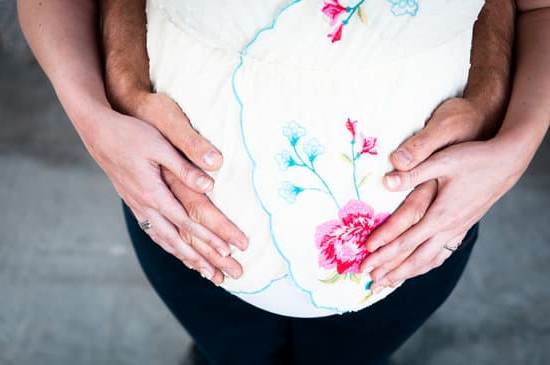Are you or someone you know experiencing the excitement and uncertainty that comes with positive pregnancy tests? It’s natural to feel a whirlwind of emotions when the test indicates a positive result. In this article, we will delve into the science behind positive pregnancy tests, exploring the biological processes that lead to these life-changing moments.
Understanding how positive pregnancy tests work involves gaining insights into the various types available in the market and distinguishing between their mechanisms. From at-home urine tests to blood tests conducted by healthcare professionals, each type has its own set of factors that contribute to accurate results.
Additionally, we will explore early signs and symptoms of pregnancy that may prompt one to take a pregnancy test in the first place. By recognizing these indicators, individuals can be better prepared for what lies ahead if they receive a positive result. Stay tuned as we delve deeper into these topics and more, offering valuable information and guidance for those navigating the journey of a positive pregnancy test result.
Different Types of Pregnancy Tests Available in the Market
When it comes to taking a pregnancy test, there are several options available in the market. Understanding the different types of pregnancy tests can help you make an informed decision about which one is best for you. Here are some of the most common types of pregnancy tests available:
- Urine-based pregnancy tests: These are the most commonly used type of pregnancy test and are available over-the-counter at drugstores. They work by detecting the presence of human chorionic gonadotropin (hCG) in the urine, a hormone produced during pregnancy.
- Blood-based pregnancy tests: These tests are typically performed at a doctor’s office or medical clinic. They can detect lower levels of hCG than urine-based tests and may be recommended if you have symptoms of early pregnancy but are getting negative results on urine-based tests.
- Digital pregnancy tests: These tests give a clear “pregnant” or “not pregnant” result on a digital display, eliminating any confusion that may come with interpreting traditional line-based tests.
It’s important to note that regardless of the type of test you choose, they all work by detecting hCG in your body. Different tests may vary in terms of sensitivity, ease of use, and cost. When selecting a pregnancy test, consider factors such as your budget, how soon you want to test after a missed period, and whether you prefer a digital readout.
Ultimately, choosing the right pregnancy test is a personal decision. Some women may prefer the convenience and privacy of an at-home urine test, while others may seek the accuracy and guidance of a blood test performed by a healthcare professional. Whatever your choice, it’s essential to follow the instructions carefully to ensure accurate results.
Early Signs and Symptoms of Pregnancy
Missed Period
One of the most common early signs of pregnancy is a missed period. If you have a regular menstrual cycle, missing your period can be a strong indicator that you may be pregnant. It’s important to note that there are other factors, such as stress or hormonal imbalances, that can also cause a missed period, so it’s essential to take a pregnancy test for confirmation.
Breast Changes
During the early stages of pregnancy, many women experience changes in their breasts. This can include tenderness, swelling, or even darkening of the nipples. These changes occur due to hormonal shifts in the body and can be one of the first signs that lead women to suspect they may be pregnant.
Nausea and Fatigue
Nausea and fatigue are also common symptoms experienced in early pregnancy. Many women report feeling unusually tired and experiencing morning sickness, which can include nausea and vomiting. These symptoms typically begin around six weeks into the pregnancy but can vary from woman to woman.
Understanding these early signs and symptoms of pregnancy can help you determine if it’s time to take a pregnancy test. If you’re experiencing any of these symptoms along with a missed period, it may be time to consider taking a test to confirm whether or not you’re pregnant.
Tips for Taking a Pregnancy Test for Accurate Results
When it comes to taking a pregnancy test, it is important to follow certain tips and guidelines to ensure accurate results. Here are some tips for taking a pregnancy test for accurate results:
- Choose the right time: It is recommended to take a pregnancy test in the morning when your urine is more concentrated, as this can increase the accuracy of the test.
- Read the instructions carefully: Different pregnancy tests may have different instructions for usage, so be sure to read them carefully before taking the test.
- Use a timer: Many pregnancy tests require a specific amount of time for results to appear. Use a timer to ensure you are reading the results within the designated timeframe.
In addition to these tips, it’s important to understand that certain medications and medical conditions can affect the accuracy of a pregnancy test. If you are unsure about how these may impact your results, it’s best to consult with your healthcare provider.
It’s also important to remember that no matter what the result is, there are support and resources available for women who have taken a pregnancy test and received a positive result. Whether this news brings feelings of joy or anxiety, it’s essential to seek out the necessary support and guidance as you navigate this new chapter in your life.
What to Do After Getting a Positive Pregnancy Test Result
Finding out that you have a positive pregnancy test can be an overwhelming and emotional experience. It’s important to stay calm and take the necessary steps to ensure a healthy pregnancy. Here are some guidelines on what to do after getting a positive pregnancy test result.
Confirm the Results
It’s not uncommon for women to feel disbelief or shock when they see a positive pregnancy test result, especially if they weren’t actively trying to conceive. If you’re unsure about the accuracy of the test, it’s recommended to confirm the results with a healthcare professional. They can conduct a blood test or ultrasound to definitively confirm your pregnancy.
Schedule an Appointment With Your Healthcare Provider
After confirming your positive pregnancy test, it’s crucial to schedule an appointment with your healthcare provider. This will allow them to assess your overall health, discuss any potential risk factors, provide prenatal care recommendations, and address any questions or concerns you may have.
Start Taking Prenatal Vitamins
In addition to scheduling an appointment with your healthcare provider, it’s essential to start taking prenatal vitamins as soon as possible. These vitamins are specifically formulated to support the nutritional needs of pregnant women and their developing babies. Folic acid, in particular, is vital for preventing birth defects in the early stages of pregnancy.
Taking these proactive steps can help ensure a smooth transition into this new chapter of your life and set the stage for a healthy pregnancy journey ahead. Remember that every woman’s experience is unique, so it’s important to seek guidance from licensed medical professionals and trusted sources for personalized advice tailored specifically for you and your baby.
Common Questions and Concerns About Positive Pregnancy Tests
Women who have recently received a positive pregnancy test result may have several questions and concerns about what to expect next. One common question is whether a false positive test result is possible. While it is rare, false positives can occur due to certain medications or medical conditions that can interfere with the accuracy of the test. It is always best to consult with a healthcare professional if there are any doubts about the test result.
Another concern that many women have after receiving a positive pregnancy test result is the risk of miscarriage. Studies show that around 10-20% of known pregnancies end in miscarriage, often before a woman even realizes she is pregnant. While it’s natural to feel anxious, it’s important to remember that most women go on to have healthy pregnancies after experiencing a miscarriage.
Additionally, some women may be concerned about how to share the news with their partner, family, and friends. This can be an emotional and overwhelming experience for many women, and it’s okay to take time to process the news before sharing it with others. Seeking support from loved ones can also be helpful during this time.
| Common Concerns | Questions After Positive Pregnancy Test |
|---|---|
| Risk of Miscarriage | Is a False Positive Possible? |
| Sharing the News | How Should I Share My News? |
| Physical Changes | What Early Pregnancy Symptoms Can I Expect? |
It’s crucial for women who receive a positive pregnancy test result to reach out for support from healthcare professionals, as well as their partner, family members, and friends. These individuals can provide valuable guidance and emotional support throughout the entire journey of pregnancy and parenthood.
Celebrating the News of a Positive Pregnancy Test
When a woman sees a positive pregnancy test result, it can be an overwhelming and emotional experience. It is a moment in which many emotions come to the surface, including joy, excitement, and even some anxiety. However, it’s important for women to take the time to celebrate this news and acknowledge the significance of a positive pregnancy test.
The moment a woman finds out about her positive pregnancy test can be celebrated in various ways. Some women choose to celebrate privately with their partner, while others may want to share the news with close family and friends right away. There is no right or wrong way to celebrate this news, as long as it feels meaningful and special to the expectant parents.
One way to celebrate a positive pregnancy test is by planning a simple yet memorable event. This could involve a small gathering with loved ones, perhaps over dinner or brunch, where the news is shared in a personal and intimate setting. It’s important for expectant parents to cherish this moment and savor the beginning of their journey into parenthood.
| Celebration Ideas | Details |
|---|---|
| Private Celebration | Celebrating with just the partner in an intimate setting at home |
| Family Gathering | Sharing the news with close family members over a special meal or get-together |
| Gift Exchange | Giving each other meaningful gifts that symbolize the joy of expecting a baby |
Support and Resources for Women With Positive Pregnancy Tests
Finding out that you have a positive pregnancy test result can be an overwhelming and emotional experience. It’s important to know that you are not alone and that there are numerous support and resources available to help you navigate this next chapter in your life. From medical assistance to emotional support, there are many avenues to explore as you prepare for motherhood.
One of the first steps after getting a positive pregnancy test is to schedule an appointment with your healthcare provider. They can provide essential prenatal care, answer any questions you may have, and offer guidance on maintaining a healthy pregnancy. In addition to medical support, there are also various community resources and support groups specifically designed for expectant mothers. These forums can provide a network of other women who are going through similar experiences and offer valuable advice and encouragement.
Financial assistance is another aspect that may arise when expecting a child. Many government programs offer aid for pregnant women, providing access to prenatal care, nutrition assistance, and childbirth classes. It’s important to explore these options early on in your pregnancy to ensure you have the necessary resources for a healthy and supported journey.
Remember, facing a positive pregnancy test result is a significant life event, so it’s okay to seek out help from loved ones, friends, or professionals if you need it. Whether it’s through online forums or local resources, there is an abundance of support available as you embark on this exciting journey towards motherhood.
Myth-Busting About Positive Pregnancy Tests
There are numerous myths and misconceptions surrounding positive pregnancy tests that can cause unnecessary stress and confusion for women. One common myth is that a faint line on a pregnancy test means the result is not accurate. In reality, even a faint line indicates a positive result, as it still means that the pregnancy hormone hCG has been detected in the urine. The intensity of the line does not determine the validity of the result.
Another myth is that certain medications or medical conditions can cause a false positive result on a pregnancy test. While some medications and medical conditions can interfere with the accuracy of a pregnancy test, false positive results are rare. It’s important for women to consult with their healthcare provider if they have concerns about their medication or medical history affecting their pregnancy test results.
Additionally, there is a misconception that getting a negative result after a positive one means the woman had a miscarriage. This is not necessarily true, as false negatives can occur due to testing too early or improper use of the home pregnancy test. It’s always best to speak with a healthcare professional if there are concerns about pregnancy test results.
It’s crucial for women to educate themselves about the facts and myths surrounding positive pregnancy tests in order to alleviate unnecessary worry and ensure accurate understanding of their results.
The Emotional Journey of Seeing a Positive Pregnancy Test Result
Seeing a positive pregnancy test result can be an overwhelming and emotional experience for many women. It is a moment of joy, excitement, and sometimes anxiety as the reality of becoming a parent sets in. The emotional journey of seeing a positive pregnancy test result can vary from person to person, but it is important to recognize and embrace the range of emotions that come with this life-changing news.
For some women, seeing a positive pregnancy test result may bring about feelings of happiness, fulfillment, and anticipation for the future. It can be a time of celebration and excitement as they start planning for their new arrival. On the other hand, some women may feel anxious, worried, or unsure about what lies ahead. It is normal to have mixed emotions in response to such significant news, and it’s important to seek support and guidance during this time.
It’s essential for women who receive positive pregnancy test results to take care of themselves both physically and emotionally. Seeking support from loved ones, healthcare professionals, or support groups can provide comfort and reassurance during this emotional journey.
It’s also crucial to prioritize self-care and make preparations for the upcoming changes that come with pregnancy and motherhood. No matter the initial emotions that come with a positive pregnancy test result, it’s important for women to know that they are not alone on this journey.
Frequently Asked Questions
How Soon Will a Pregnancy Test Read Positive?
A pregnancy test can read positive as early as 10 days after conception, but for most women, it’s more accurate around the time of a missed period.
How Many Weeks Pregnant Are You When You Get a Positive Test?
Typically, when you get a positive pregnancy test result, you are about 4-6 weeks pregnant. This is calculated from the first day of your last menstrual period.
Can a Pregnancy Test Be Positive When You’re Not Pregnant?
While it’s uncommon, a false positive pregnancy test can occur due to certain medical conditions or medications. It’s important to follow up with a healthcare provider for confirmation if you suspect an inaccurate result.

Welcome to my fertility blog. This is a space where I will be sharing my experiences as I navigate through the world of fertility treatments, as well as provide information and resources about fertility and pregnancy.





